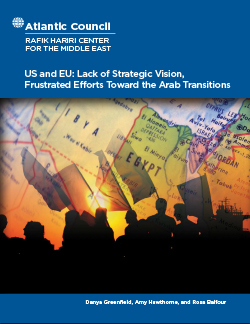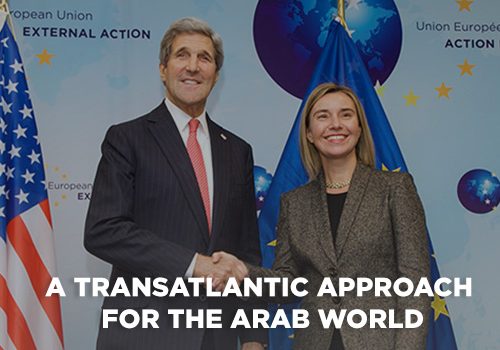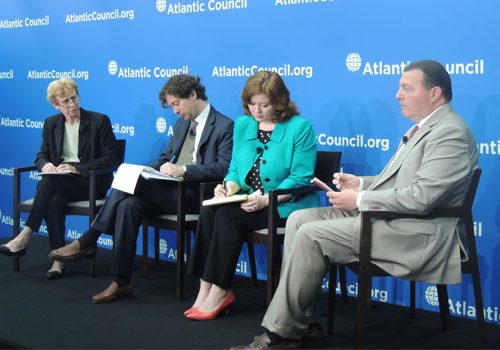A new Atlantic Council report, US and EU: Lack of Strategic Vision, Frustrated Efforts Toward the Arab Transitions, argues the United States and its European allies lack strategic vision in supporting the Arab countries that embarked in 2011 on a democratic path—Egypt, Libya, Tunisia, and Yemen—and have not lived up to their stated commitments for robust support. While the European Union (EU) and the United States have tried to advance specific assistance initiatives in the transitioning countries—some of which were announced more than two years ago—they have not made as much headway as hoped over the past year. In part, the lack of progress is due to serious political and security challenges in these countries, yet bureaucratic delays, insufficient funding, and inadequate political will in Brussels and Washington also hampered success.
Report authors Danya Greenfield, deputy director of the Atlantic Council’s Rafik Hariri Center for the Middle East, and Senior Fellow Amy Hawthorne, together with Rosa Balfour, head of the Europe in the World Program at the European Policy Center in Brussels, argue that despite clear convergence between the United States and the EU in values and professed objectives in the Arab transitioning countries, the transatlantic powers have not been able to leverage their joint weight and influence toward the Arab transitions. The report’s central conclusion is that democratic outcomes in the region remain critical to Western interests; the authors argue that the best hope for encouraging the development of prosperous Arab democracies with inclusive and ultimately stable governing systems, is a reenergized, redesigned strategic approach for Western support. Specifically, the authors offer the following recommendations:
- The US administration and EU leadership should develop a sustainable diplomatic and assistance strategy for each transitioning country, backed by clear high-level support that focuses on democratic norms and universal human rights; democracy assistance should remain a significant and visible part of aid packages for these countries, even in restrictive environments such as Egypt.
- The United States and EU should redouble efforts to offer economic aid such as support for trade expansion, sustainable job creation, investment, vocational education and training, and assistance with needed economic reforms that are particular US and European strengths and that other donors, such as the wealthy Gulf countries, cannot offer. At the same time, the United States and the EU should engage directly on a high-level, bilateral basis with key Gulf countries to integrate an economic reform agenda into Gulf financing.
- The United States and European partners should allocate increased resources for security sector reform—with a focus on supporting efforts to change the way security forces and police engage with their populations, rather than only providing equipment and training for forces engaged in border security and counterterrorism.



